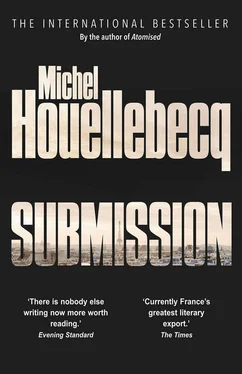The reception was at six, on the top floor of the Institute of the Arab World, which had been hired for the occasion. I felt nervous as I showed my invitation: Who would be there? Some Saudis, definitely: the invitation guaranteed the presence of a Saudi prince whose name I recognised as that of the main donor behind the new Sorbonne. There would probably be some of my old colleagues, too, at least the ones who’d agreed to work under the new administration — but I didn’t know anyone who had, except for Steve, and Steve was the last person I wanted to see.
I did recognise one former colleague, when I stepped inside the large, chandelier-lit hall. I didn’t know him personally, though we’d spoken once or twice, but Bertrand de Gignac was world-famous in the field of medieval literature. He was regularly invited to lecture at Columbia and Yale, and he was the author of the standard reference work on the Chanson de Roland . As far as recruitment went, he was the one major success the new university president could claim. Beyond that, I didn’t have much to talk to him about, the field of medieval literature being basically terra incognita to me, so I wisely accepted several mezes — they were excellent, the hot and the cold ones, too. So was the wine, a Lebanese red …
Still, I got the feeling that the reception wasn’t a total success. Small groups of three to six people, Arab and French, made their way around the elegant hall, barely speaking. The Arabo-Andalusian background music, piercing and sinister, didn’t help, but that wasn’t the problem, and after walking around with the other guests for forty-five minutes, after a dozen mezes and four glasses of wine, I suddenly saw the problem: we were all men. No women had been invited, and to keep up a sociable atmosphere without any women around, and without falling back on football — which would have been inappropriate in what was, after all, an academic setting — turned out to be a serious challenge.
Just then I caught sight of Lacoue, standing in a thicker group that had retreated to a corner of the hall. Besides him there were maybe ten Arabs and two Frenchmen, all talking with great intensity, except for one middle-aged man with a hooked nose and a fat, scowling face. He was dressed simply, in a long white djellaba, but I could see he was the most important man in the group, probably the prince himself. The others were talking over one another, offering what seemed to be justifications, but he just stood there, and although he nodded his head every now and then, his face remained impassive. Clearly there was some kind of problem, but it had nothing to do with me, so I went back the way I came, accepting a cheese samboussek and fifth glass of wine.
An old, thin, very tall man with a long salt-and-pepper beard went up to the prince, who stepped aside to speak to him in private. Having lost its centre, the group instantly broke up. Wandering aimlessly through the hall with one of the other Frenchmen, Lacoue saw me and walked up with a small nod hello. He seemed out of his element, and he made his introductions so quietly that I didn’t even catch the name of his companion, whose hair was slicked back, each strand carefully arranged. He wore a magnificent three-piece suit of midnight-blue fabric with nearly invisible white stripes. It had a light sheen and looked immensely soft. I thought it had to be silk and almost reached out to touch it, but I caught myself in time.
The prince, Lacoue explained, was horribly put out because the minister of education hadn’t come to the reception despite having formally promised to do so. Not only that — there wasn’t a single representative from the ministry, not one, ‘not even the secretary of universities’. He was beside himself.
‘I already told you, there is no more secretary of universities,’ his companion growled. According to him, the situation was even worse than Lacoue thought: the minister had definitely meant to come, he’d confirmed just the day before, but Ben Abbes himself had intervened for the express purpose of humiliating the Saudis. This was in line with other recent measures, of much broader importance, such as relaunching the nuclear energy programme and funding research into electric cars. The government was racing towards total independence from Saudi oil. Obviously, none of this had anything to do with the Islamic University of Paris-Sorbonne, but I supposed it was the university president who’d have to deal with the fallout. Just then Lacoue turned towards a middle-aged man, a new arrival, who was striding in our direction. ‘Here’s Robert!’ he cried, hugely relieved, as if he were greeting the Messiah.
Before he brought Rediger up to date, Lacoue introduced me, this time audibly. Rediger clasped my hand energetically, nearly crushing it between his powerful palms, all the while saying how happy he was to meet me and how long he’d looked forward to the pleasure. Physically, he was a fairly remarkable specimen, quite tall and solidly built. In fact, with his broad chest and his muscles, he looked more like a rugby tackle than a professor. His face was tanned and deeply lined, and although his hair was completely white, it was very thick. He had a crew cut, and he was dressed, rather unexpectedly, in jeans and a black leather aviator jacket.
Lacoue quickly filled him in. Rediger nodded, and muttered that he’d had a feeling something like this might happen. Then he thought a moment. ‘I’ll call Delhommais,’ he said. ‘Delhommais will know what to do.’ He took out a small, almost feminine mobile phone — it looked tiny in his hand — and stepped a few metres away to make his call. Lacoue and his companion watched without daring to go near him, both rigid with suspense. They were starting to bore me, these two, with their little dramas. What’s more, they struck me as complete idiots. Obviously these petro-dollars required a certain amount of care and feeding, as it were, but in the end all they had to do was take some flunkey and introduce him, not as the minister they’d seen on TV, but as his chief of staff. The joker in the three-piece suit would have made a perfect chief of staff (just to start with who was on hand) and the Saudis would have been none the wiser. Really, they were making everything more complicated than it needed to be. But that was their problem. I helped myself to another glass of wine and went out onto the terrace. The view of Notre-Dame truly was magnificent. It was warmer out than before, and the rain had stopped. The moonlight flickered on the ripples of the Seine.
I must have spent a long time in this reverie, and when I went back inside the guests, still all men, of course, had thinned out. I didn’t see Lacoue or the three-piece suit. At least the evening hadn’t been a complete waste, I told myself, as I took a menu from the caterer. The mezes really had been good, plus they delivered — it would be a change from Indian. While I was waiting for my coat, Rediger walked up. ‘You’re not leaving?’ he asked, with a crestfallen spreading of the arms. I asked whether he’d managed to resolve the breach of protocol. ‘Yes, it’s all sorted out. The minister won’t come tonight, but he called the prince personally and invited him to breakfast tomorrow at the ministry. Schramek was right, I’m afraid: Ben Abbes is actively trying to humiliate them, now that he’s reconnecting with his old friends the Qataris. We’ll have plenty more trouble where that came from. But what can you do …’ He waved the subject away, then he laid his hand on my shoulder. ‘I’m awfully sorry we didn’t get a chance to talk. You should come over sometime for tea, so that we can have a real conversation …’ And all at once he smiled. He had a lovely smile, very open, almost childlike, and extremely disarming in such a masculine man. I think he knew it, and knew how to use it. He gave me his card. ‘Next Wednesday, shall we say, five-ish? If you’re free.’ I said I was.
Читать дальше







